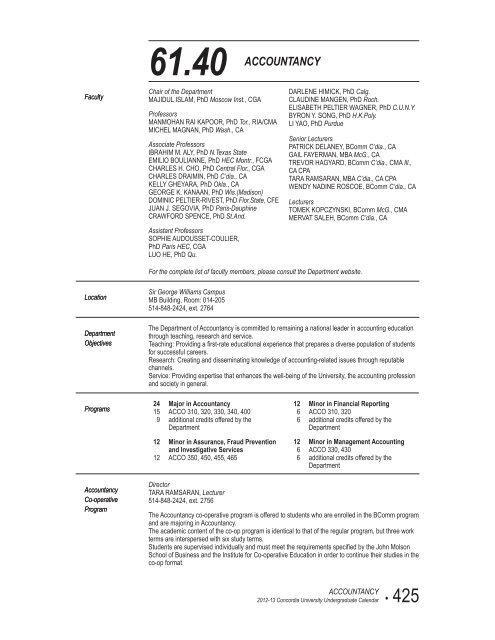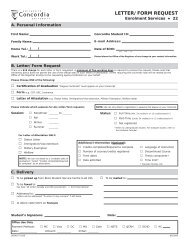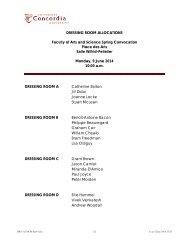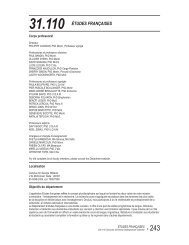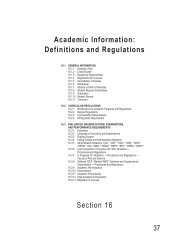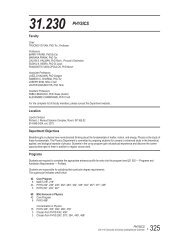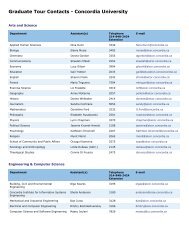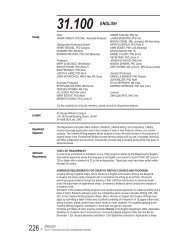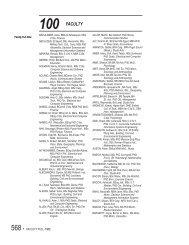61.40 ACCOUNTANCY - Concordia University
61.40 ACCOUNTANCY - Concordia University
61.40 ACCOUNTANCY - Concordia University
You also want an ePaper? Increase the reach of your titles
YUMPU automatically turns print PDFs into web optimized ePapers that Google loves.
Faculty<br />
Location<br />
Department<br />
Objectives<br />
Programs<br />
Accountancy<br />
Co‑operative<br />
Program<br />
<strong>61.40</strong> <strong>ACCOUNTANCY</strong><br />
Chair of the Department<br />
MAJIDUL ISLAM, PhD Moscow Inst., CGA<br />
Professors<br />
MANMOHAN RAI KAPOOR, PhD Tor., RIA/CMA<br />
MICHEL MAGNAN, PhD Wash., CA<br />
Associate Professors<br />
IBRAHIM M. ALY, PhD N.Texas State<br />
EMILIO BOULIANNE, PhD HEC Montr., FCGA<br />
CHARLES H. CHO, PhD Central Flor., CGA<br />
CHARLES DRAIMIN, PhD C’dia., CA<br />
KELLY GHEYARA, PhD Okla., CA<br />
GEORGE K. KANAAN, PhD Wis.(Madison)<br />
DOMINIC PELTIER‑RIVEST, PhD Flor.State, CFE<br />
JUAN J. SEGOVIA, PhD Paris‑Dauphine<br />
CRAWFORD SPENCE, PhD St.And.<br />
Assistant Professors<br />
SOPHIE AUDOUSSET‑COULIER,<br />
PhD Paris HEC, CGA<br />
LUO HE, PhD Qu.<br />
Sir George Williams Campus<br />
MB Building, Room: 014‑205<br />
514‑848‑2424, ext. 2764<br />
DARLENE HIMICK, PhD Calg.<br />
CLAUDINE MANGEN, PhD Roch.<br />
ELISABETH PELTIER WAGNER, PhD C.U.N.Y.<br />
BYRON Y. SONG, PhD H.K.Poly.<br />
LI YAO, PhD Purdue<br />
Senior Lecturers<br />
PATRICK DELANEY, BComm C’dia., CA<br />
GAIL FAYERMAN, MBA McG., CA<br />
TREVOR HAGYARD, BComm C’dia., CMA Ill.,<br />
CA CPA<br />
TARA RAMSARAN, MBA C’dia., CA CPA<br />
WENDY NADINE ROSCOE, BComm C’dia., CA<br />
Lecturers<br />
TOMEK KOPCZYNSKI, BComm McG., CMA<br />
MERVAT SALEH, BComm C’dia., CA<br />
For the complete list of faculty members, please consult the Department website.<br />
The Department of Accountancy is committed to remaining a national leader in accounting education<br />
through teaching, research and service.<br />
Teaching: Providing a first‑rate educational experience that prepares a diverse population of students<br />
for successful careers.<br />
Research: Creating and disseminating knowledge of accounting‑related issues through reputable<br />
channels.<br />
Service: Providing expertise that enhances the well‑being of the <strong>University</strong>, the accounting profession<br />
and society in general.<br />
24 Major in Accountancy<br />
15 ACCO 310, 320, 330, 340, 400<br />
9 additional credits offered by the<br />
Department<br />
12 Minor in Assurance, Fraud Prevention<br />
and Investigative Services<br />
12 ACCO 350, 450, 455, 465<br />
Director<br />
TARA RAMSARAN, Lecturer<br />
514‑848‑2424, ext. 2756<br />
12 Minor in Financial Reporting<br />
6 ACCO 310, 320<br />
6 additional credits offered by the<br />
Department<br />
12 Minor in Management Accounting<br />
6 ACCO 330, 430<br />
6 additional credits offered by the<br />
Department<br />
The Accountancy co‑operative program is offered to students who are enrolled in the BComm program<br />
and are majoring in Accountancy.<br />
The academic content of the co‑op program is identical to that of the regular program, but three work<br />
terms are interspersed with six study terms.<br />
Students are supervised individually and must meet the requirements specified by the John Molson<br />
School of Business and the Institute for Co‑operative Education in order to continue their studies in the<br />
co‑op format.<br />
<strong>ACCOUNTANCY</strong><br />
2012‑13 <strong>Concordia</strong> <strong>University</strong> Undergraduate Calendar • 425
Courses<br />
426 •<br />
Liaison between the student, the employers, and the Institute for Co‑operative Education is provided<br />
by the Accountancy co‑op academic director and the co‑op committee.<br />
Please refer to §24 of this Calendar for a full description of the co‑operative format of the program.<br />
ACCO 220 Financial and Managerial<br />
Accounting (3 credits)<br />
This course provides an introduction to accounting<br />
principles underlying the preparation of financial<br />
reports with an emphasis on the relationship<br />
between accounting information and production<br />
decisions. It examines the relationship between<br />
costs, production volume, and profit, as well as<br />
the practical benefits of standard costs for plan‑<br />
ning and control purposes. The role of accounting<br />
information in various manufacturing decisions is<br />
also highlighted.<br />
NOTE: This course would be useful to<br />
Engineering students.<br />
NOTE: JMSB students may not take this course<br />
for credit.<br />
NOTE: Students who have received credit for<br />
ACCO 230, 240 may not take this course for<br />
credit.<br />
ACCO 230 Introduction to Financial<br />
Accounting (3 credits)<br />
This course provides an introduction to account‑<br />
ing concepts underlying financial statements of<br />
organizations. It focuses on the analysis, mea‑<br />
surement, and reporting of business transactions<br />
to users of financial statements. It also examines<br />
the uses and limitations of accounting information<br />
for investment and credit decisions.<br />
NOTE: JMSB students may not take this course<br />
for credit.<br />
NOTE: Students who receive a grade of “C” or<br />
better may be exempt from COMM 217.<br />
NOTE: Students who have received credit for<br />
ACCO 220 may not take this course for credit.<br />
ACCO 240 Introduction to Managerial<br />
Accounting (3 credits)<br />
Prerequisite: ACCO 230. This course examines<br />
the role of accounting information for decision<br />
making, and focuses on concepts and techniques<br />
used in planning operations, controlling activities,<br />
and evaluating managerial performance. New<br />
developments are addressed with a focus on<br />
contemporary business issues and real‑world<br />
applicability of management accounting concepts<br />
and techniques.<br />
NOTE: JMSB students may not take this course<br />
for credit.<br />
NOTE: Students who receive a passing grade<br />
may be exempt from COMM 305.<br />
NOTE: Students who have received credit for<br />
ACCO 220 may not take this course for credit.<br />
ACCO 310 Financial Reporting I (3 credits)<br />
Prerequisite: COMM 305 previously or<br />
concurrently. Intensive study is made of the<br />
theory and practice of external financial reporting<br />
by business organizations, focusing on concepts<br />
and procedures underlying the measurement of<br />
assets and the determination of income.<br />
<strong>ACCOUNTANCY</strong><br />
2012‑13 <strong>Concordia</strong> <strong>University</strong> Undergraduate Calendar<br />
ACCO 320 Financial Reporting II (3 credits)<br />
Prerequisite: ACCO 310. This course continues<br />
the intensive study of ACCO 310, with particular<br />
emphasis on accounting for liabilities, share‑<br />
holders’ equity, and other related topics such<br />
as earnings per share, pension accounting, and<br />
accounting for income taxes.<br />
ACCO 330 Cost and Management<br />
Accounting (3 credits)<br />
Prerequisite: COMM 305. This course provides<br />
an examination of the techniques, systems, and<br />
procedures applicable to the managerial use of<br />
accounting information for planning, decision‑<br />
making, and control. Topics include cost accu‑<br />
mulation and allocation, product and process<br />
costing, flexible budgeting and variance analysis,<br />
evaluation of managerial performance, and<br />
transfer pricing.<br />
ACCO 340 Income Taxation in Canada<br />
(3 credits)<br />
Prerequisite: COMM 217. This course provides<br />
core knowledge regarding the federal income<br />
tax structure and the Canadian goods and<br />
services tax system. It examines the taxation<br />
of employment, business, property income,<br />
capital gains and other sources of income for an<br />
individual.<br />
ACCO 350 Accounting and Information<br />
Technology (3 credits)<br />
Prerequisite: COMM 226 or 301, 305; ACCO 310.<br />
This course examines the role of computerized<br />
accounting information systems (AIS) in organiza‑<br />
tions. Students learn how to justify, design, and<br />
utilize AIS to provide pertinent information to<br />
managers for decision making. The course helps<br />
to identify appropriate usage of information tech‑<br />
nology in specific accounting contexts. Topics<br />
include e‑business, computer fraud, information<br />
systems security and controls, systems analysis,<br />
and management of information technology.<br />
ACCO 355 Analysis of Financial<br />
Statements (3 credits)<br />
Prerequisite: COMM 305, 308. This course<br />
explores the usefulness and limitations of<br />
financial statements for investment and credit<br />
decisions. It focuses on the interpretation of the<br />
information contained in financial statements<br />
which reflect the economic characteristics of<br />
the firm and its strategic business decisions.<br />
Instruments and techniques for financial state‑<br />
ment analysis are discussed and applied to<br />
case studies and actual companies.<br />
NOTE: Students in the Accountancy Major may<br />
not take this course for credit.<br />
NOTE: This course would be useful for students<br />
in Finance and Management.
ACCO 365 U.S. Federal Taxation (3 credits)<br />
Prerequisite: COMM 217 or ACCO 230. This<br />
course familiarizes the student with individual<br />
and corporate taxation in the U.S. The use of<br />
professional judgment in the application of tax<br />
planning recommendations is also addressed in<br />
this course.<br />
NOTE: Students who have received credit for<br />
this topic under an ACCO 470 number may not<br />
take this course for credit.<br />
ACCO 400 Accounting Theory (3 credits)<br />
Prerequisite: ACCO 320. This course examines<br />
the theoretical foundations of the contemporary<br />
approach to financial reporting, and the political<br />
and pragmatic considerations in the development<br />
of the conceptual framework underlying current<br />
accounting standards. Alternative theories of<br />
accounting are discussed and controversial<br />
areas are emphasized.<br />
ACCO 410 Governmental and Not‑for‑<br />
Profit Accounting (3 credits)<br />
Prerequisite: ACCO 320. This course introduces<br />
the theory and concepts that underlie the financial<br />
accounting, control, and reporting in not‑for‑profit<br />
organizations. General concepts and principles<br />
are illustrated by comparing the practices of<br />
selected not‑for‑profit organizations, including<br />
local and federal governments and universities,<br />
with authoritative standards.<br />
ACCO 420 Financial Reporting III (3 credits)<br />
Prerequisite: ACCO 320. This course examines<br />
the theory and practice of accounting for inter‑<br />
corporate investments, business combinations,<br />
consolidation of financial statements, and foreign<br />
currency transactions and operations.<br />
ACCO 430 Advanced Management<br />
Accounting (3 credits)<br />
Prerequisite: ACCO 330. The course examines<br />
the integrative and interdisciplinary role of<br />
management accounting and its contribution to<br />
the complex management process. The course<br />
focuses on cases that deal with strategic issues in<br />
management accounting and management’s need<br />
for both quantitative and qualitative information<br />
for planning, control, performance evaluation and<br />
decision making.<br />
ACCO 435 Integrative Management<br />
Accounting Cases (3 credits)<br />
Prerequisite: ACCO 430. This course integrates<br />
topics in financial and management accounting,<br />
finance, and business strategy covered in<br />
previous courses. Emphasis is placed on topics<br />
of interest to students pursuing the Certified<br />
Management Accountant (CMA) designation.<br />
Cases are analyzed in individual and group<br />
settings using the methodology required for the<br />
CMA Case Examination.<br />
NOTE: Students who have received credit for<br />
this topic under an ACCO 470 number may not<br />
take this course for credit.<br />
ACCO 440 Advanced Taxation (3 credits)<br />
Prerequisite: ACCO 340. This course provides<br />
core knowledge regarding the federal taxation<br />
of corporations, partnerships, and trusts. It<br />
introduces analytical skills needed to make<br />
decisions regarding various business transfers,<br />
combinations, incorporation and estate planning<br />
issues for corporations and shareholders.<br />
ACCO 450 Assurance Services (3 credits)<br />
Prerequisite: ACCO 320 previously or concurrently.<br />
This course examines the concepts and current<br />
standards of various assurance services, especially<br />
the audit of financial statements. It emphasizes the<br />
audit process and the role of the public accountant<br />
in expressing an opinion on the financial state‑<br />
ments of an organization.<br />
ACCO 455 Fraud Prevention and<br />
Investigation (3 credits)<br />
Prerequisite: COMM 217, 315. This course<br />
examines the principles of and methodology<br />
used in fraud detection and deterrence. Topics<br />
covered may include skimming, cash larceny,<br />
cheque tampering, billing, payroll and expense<br />
reimbursement schemes, non‑cash misappro‑<br />
priations, corruption, fraudulent financial state‑<br />
ments, conducting investigations and interviewing<br />
witnesses. This course may also examine<br />
auditors’ legal responsibilities towards fraud, the<br />
evaluation of internal controls and important<br />
pieces of legislation such as the Sarbanes‑Oxley<br />
Act and the Criminal Code. Finally, the ethical<br />
aspects associated with fraud are discussed.<br />
Class sessions consist of lectures, real‑life fraud<br />
case discussions and the presentation of DVDs<br />
from the Association of Certified Fraud Examiners.<br />
NOTE: Students who have received credit for<br />
this topic under an ACCO 470 number may not<br />
take this course for credit.<br />
ACCO 465 Advanced Assurance Services<br />
(3 credits)<br />
Prerequisite: ACCO 450. This course covers<br />
important topics and concepts in auditing and<br />
assurance services. It builds on topics covered<br />
in ACCO 450 and introduces specialized and<br />
advanced topics that are of particular importance<br />
to professional accountants. In covering topics<br />
and their application, the course focuses on<br />
decision‑making processes followed by auditors.<br />
The course embraces the requirements of the CA<br />
Student Competency Map for assurance and the<br />
CGA Modules and Readings AU2.<br />
NOTE: Students who have received credit for<br />
this topic under an ACCO 470 number may not<br />
take this course for credit.<br />
ACCO 470 Special Topics in Accounting<br />
(3 credits)<br />
Prerequisite: Written permission of the Depart‑<br />
ment. This course is intended to complement<br />
accounting courses taken previously or concur‑<br />
rently at the senior level. It provides an oppor‑<br />
<strong>ACCOUNTANCY</strong><br />
2012‑13 <strong>Concordia</strong> <strong>University</strong> Undergraduate Calendar • 427
428 •<br />
tunity for more intensive study in one or more<br />
specific topics in accounting.<br />
NOTE: Specific topics for this course and<br />
prerequisites relevant in each case will be stated<br />
in the Undergraduate Class Schedule.<br />
ACCO 490 Seminar in Taxation (3 credits)<br />
Prerequisite: ACCO 440. This course provides<br />
an in‑depth coverage of taxation issues. It empha‑<br />
sizes the development of professional skills in<br />
the application of tax principles and concepts<br />
to the solution of complex tax problems facing<br />
individuals, trusts, and corporations.<br />
<strong>ACCOUNTANCY</strong><br />
2012‑13 <strong>Concordia</strong> <strong>University</strong> Undergraduate Calendar


